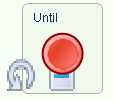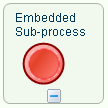End Event |
|
An End event is a BPMN construct that indicates an end of a process. An End event will not have any outgoing process flow. A valid process model should have at least one End event, and there can be multiple End events in a process model. The outcome of reaching an End event is known as an End event result, based on which, there are different types of End events as described below.
Table 1. End Event Types
Type |
Description |
Graphical Representation |
|---|---|---|
None |
This type of End event does not have any result defined. In a sub-process, the end event triggers the process flow to go back to the parent process. |
|
Message |
This type of End event indicates that a message is sent to a participant at the conclusion of the process. At the end of the process, an output message is sent by the sub-process to the parent process. |
|
Error |
This type of End event indicates that a named error should be generated at the conclusion of the process. This error will be caught by an Intermediate event within the event context. In a sub-process, a process error can be used for exception handling, which will be linked to the exception handling event of the parent process. |
|
Rollback |
This type of End event indicates that a compensation is necessary. The compensation identifier will trigger an Intermediate event when the process is rolled back. |
|
Break Loop |
This type of End event functionality helps to break and exit out of a loop and the execution continues from the next immediate activity after the loop. |
|
Continue Loop |
This type of End event functionality helps to break the current loop and start with the next iteration of the loop. |
|
Terminate |
This type of End event functionality terminates process execution. |
|
Abort |
This type of End event functionality aborts process execution. |
|








